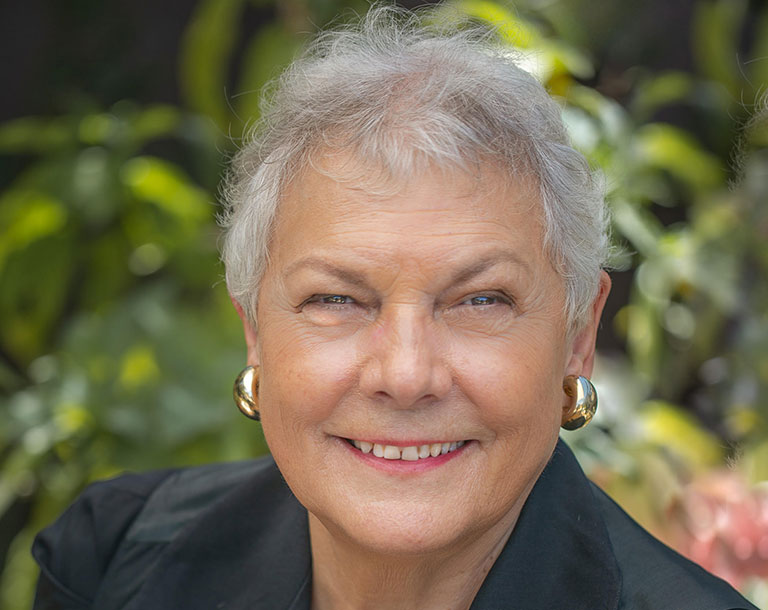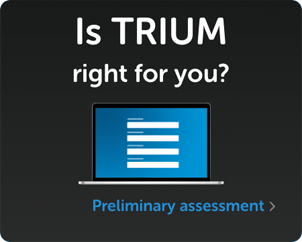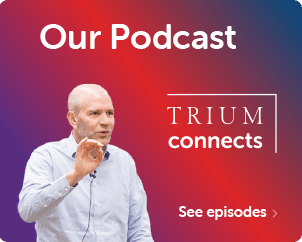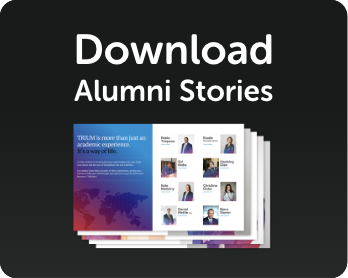

Vera P. Weill-Halle
Vera P. Weill-Halle (TRIUM Class of 2009)
Co-Founder, Brighter Ventures
Driven. This is the word that defines Vera Weill-Halle. “When I put my mind to something, I follow it all the way,” she says. She traces her determined drive to her childhood as a political refugee—she and her family escaped Yugoslavia when she was fifteen and landed in a refugee camp in Italy. “I became a thirty-year-old person then. I skipped my teenage years and became an adult,” making it, as she says, a turning point in my life. But the tumult also helped her realize and nurture the sense of determination that would help her forge a successful life and career. “From then on, I set a path out for myself, ensuring that I always followed it, and made education and life-long learning my purposeful focus.”
That path led her to an accomplished international career. She first joined the United Nations in 1977. Ten years later, she established the U.S. presence for the UN International Fund for Agricultural Development (IFAD) and served as the Director of the IFAD’s North American Liaison Office, simultaneously managed offices in Washington, DC, and in New York City at UN Headquarters. In 2004, she was appointed as the first Director of the Resource Mobilization Division of IFAD, headquartered in Rome. Throughout her career and international postings, Vera became a seasoned expert in strategy, fundraising, business development, and international development: specializing in women’s empowerment and entrepreneurial development, environmental sustainability, and fostering and building partnerships between the private sector and international organizations.
Vera’s passion for policy change, especially on environmental and climate-change solutions, which has guided her career, led her to her latest initiative, Brighter Ventures, an organization founded by herself and two other TRIUM alumni. Brighter Ventures is dedicated to advancing women-led entrepreneurship and promotes access and opportunity for women entrepreneurs.
Could you tell us about your background and what first attracted you to TRIUM? What were your main motivations and objectives when you joined the program?
When I joined I had over 30 years of director-level professional experience in international and business development, working with the United Nations’ system of organizations, as well as with the private sector in helping them create business opportunities with UN entities.
I applied to TRIUM because I was retiring from the United Nations and embarking on a new career path, one in the private sector. I wanted a degree that would help me translate my experience and skills from an organization like the UN into the private sector, which had its own language and own infrastructures. What sold me on TRIUM is that it is a program truly designed for executives.
When I entered the classroom for the first time and saw that at least one-third of my cohort were women, I was thrilled. I realized having this personal interest and desire was not unique to me, and that there was a growing demand for women executives to increase their skill set.
You founded Brighter Ventures alongside fellow TRIUM alums Olga Granaturova (Class of 2015) and Natalia Blokhina (Class of 2015) with the purpose to advance women-led entrepreneurship. Can you tell us a bit more about how the three of you joined forces and your inspiration behind launching the organization?
I like how the entrepreneurial spirit creates innovation and spurs economic growth in communities. After completing my EMBA I was shocked to learn that women face significant obstacles in the entrepreneurial space – they lack access to networks, coaching and funding. I am determined to showcase and support women entrepreneurs and help them identify opportunities to operate in this space.
As fortune would have it, Natalia, Olga, and I were at a meeting in New York for the 20th anniversary for TRIUM and—although we did not previously know each other—we shared a passion for women’s rights and access to opportunity. They sought to create an organization that would highlight the key issues and obstacles facing women entrepreneurs and, in the process, establish a global competition for women entrepreneurs. This aligned with some of the work I had done at the UN on increasing women’s job opportunities and related advocacy goals. We embarked on our journey and established an organization, secured TRIUM’s collaboration on our initiative, that focused on helping women overcome the obstacles they face as entrepreneurs.
So, this is the start of my third career. I have learned so much in my previous two careers and now I want to give back and help others while also learning something new. My motto is: a day without learning something new is a day lost.
Only 2.2% of all venture capital dollars went to women founders in 2018. Brighter Ventures is changing that by enabling network entry, coaching, access to capital, and visibility to support women entrepreneurs. Can you talk about the increased economic impact from female entrepreneurial participation?
The fluctuation of women in the workforce during the pandemic is a good case study. We saw a massive migration of women out of the labor force, as women became the default caregivers. Given the tumult of the situation, women simply could not sustain both career and caregiving responsibilities. Not only is this a shame on a cultural level, but economically, this will have a profound negative impact on productivity and growth.
On a brighter note, we are also seeing more women leaving traditional jobs and seeking entrepreneurial opportunities. Women deserve the opportunity to create businesses and pursue entrepreneurial career paths in which they can design their careers and give themselves more agency over their working lives, so that they don’t have to choose between their roles as nurturers and career women.
Brighter Ventures is committed to giving women opportunity, enhancing their access to networks, coaching and support, as well as funding. Our emphasis is to support women enterprises with high-growth potential.
What is an area of growth you’re particularly passionate about for female entrepreneurs and would like to see more of at Brighter Ventures?
I’m interested in preventing climate change and creating environmentally sustainable economies. I have been an advocate of these issues in every organization I’ve been involved in. It’s something I want to continue in the entrepreneurial space. At Brighter Ventures I would like to facilitate the entry of more women to the process of solving these existential threats. Over the last few years, I have been working with organizations in the San Francisco Bay area identifying women entrepreneurs who are contributors to this sector.
We see many people looking to the tech sector to help solve our current problems. But the solution will have to be more than technical – it’s also a social issue. Our societies social fabric is being stressed and our wellbeing – physical and social – is under threat. I really do think that women can bring fresh new perspectives and create sustainable solutions to our pressing environmental threats.
Women face unique challenges of becoming and operating at senior level in business. What advice do you have for women leaders, or aspiring leaders based on your lived experience?
One of my biggest recommendations is to create as strong of a network as possible. Build relationships in different sectors and from different areas. For several structural and historical reasons, men have an easier time building networks. Women are still reluctant to ask for help. We don’t want to impose; we have a harder time asking for help. But you must invest in the relationship around you and build a net for yourself and identify mentors (men and women) who can further your personal and professional growth.
At the same time, women in positions of leadership should be a lending hand to other women. As we advance, we need to bring other women along as well. I have provided coaching to women and participated in mentorship positions, and believe that when women lift other women, it is better for us all.
What is the best advice you have received?
The best professional advice I received was to always be true to myself and to my value system. This advice has allowed me to keep my integrity in place. Early on in my relations with others, it helped me establish clear expectations and set boundaries. I have employed this lesson in both my personal and professional lives and it has served me well. This is still valid advice to pass on. However, I would add two more points: 1) Never stop learning and acquiring new skill sets; this will help you prepare for the future and its changing demands and requirements, and 2) Be ready with a quick and honest response if your superiors ask you to do something, which you believe, is not in the organization’s best interest. Before responding, ask them if they would like you to give them your best advice or any advice. This allows you to set parameters. If they choose the “best advice” option, you will prevent potential mistakes to be made and they will thank you for it later. If they choose the “any advice” option, have them own that choice and explain the consequences. Even if you must carry out that directive, your integrity will be intact.
What return on investment did you see from TRIUM?
TRIUM was an amazing experience, beyond my expectations. It has fostered life-long friendships and helped me build new professional relationships with other executives in the Program. It also opened an opportunity for me to work directly with the private sector. In many ways, it broadened my perspective on businesses and how they function – particularly in early-stage entrepreneurial spaces. Now I can participate in the overlap of these two things and thereby help women succeed in the business world. It is the best of both worlds.






